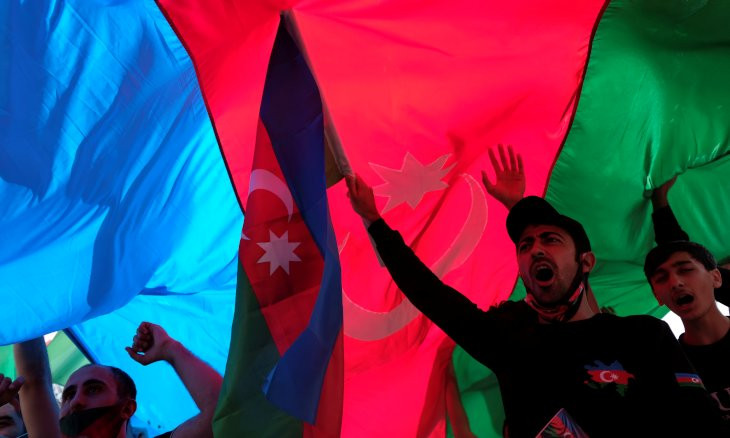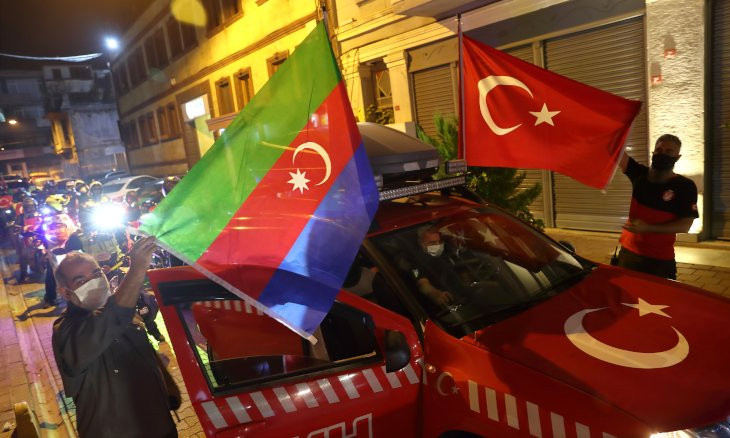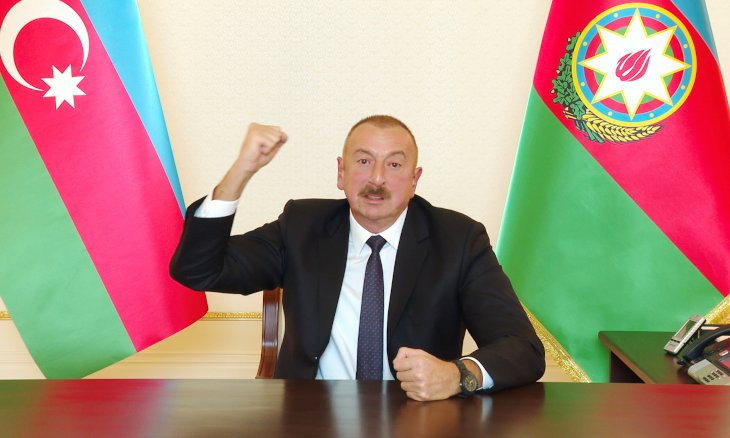Turkey slams ceasefire efforts in Nagorno-Karabakh, as Moscow warns of Islamist mercenaries
Turkish Foreign Minister Mevlüt Çavuşoğlu on Oct. 6 criticized international efforts to tackle the Azeri-Armenian conflict over the Nagorno-Karabakh region, while Sergei Naryshkin, the head of Russia's SVR Foreign Intelligence Service, said that the conflict, which broke out on Sept. 27, was attracting people he described as mercenaries and terrorists from the Middle East.
Reuters
Turkish Foreign Minister Mevlüt Çavuşoğlu on Oct. 6 criticized international efforts to tackle the Azeri-Armenian conflict over the Nagorno-Karabakh region, saying they had achieved nothing in nearly 30 years.
Fighting over Nagorno-Karabakh, which belongs to Azerbaijan under international law but is populated and governed by ethnic Armenians, has risen to its worst level since the 1990s.
Turkey has condemned what it calls Armenian occupation of Azeri lands and vowed full solidarity with its ethnic Turkic kin in Azerbaijan. Ankara has repeatedly called on Yerevan to withdraw its troops from Nagorno-Karabakh.
Speaking during a visit to the Azeri capital Baku on Oct. 6, Çavuşoğlu said a ceasefire alone would not be sufficient to end the fighting.
"We look at the calls coming from around the world, and it's 'immediate ceasefire.' What then? There was a ceasefire until now, but what happened?" Çavuşoğlu said in comments broadcast on Turkish television.
 Azerbaijani nationalists are sick, just like Armenian nationalists: Azeri analyst
Azerbaijani nationalists are sick, just like Armenian nationalists: Azeri analyst"There can be a ceasefire, but what will be the result?" he added. "Can you tell Armenia to immediately withdraw from Azeri lands? Can you come up with a solution for it to withdraw? No, it's the same calls for 30 years."
Last week, France - a co-chair of the Minsk group mediating the conflict along with Russia and the United States - proposed a new initiative to restart talks between Baku and Yerevan. But those were hampered when Azeri President Ilham Aliyev said Baku needed guarantees to consider a truce.
Çavuşoğlu also dismissed the efforts, saying they could not treat Armenia and Azerbaijan as equals, as that would amount to "rewarding the occupier".
"The whole world now needs to understand this cannot go on like this," he said.
Islamist fighters pose threat to Moscow: Russia
Russia's foreign intelligence chief, meanwhile, warned on Oct. 6 that the conflict was drawing in thousands of Islamist radicals who posed a threat to Moscow.
Sergei Naryshkin, the head of Russia's SVR Foreign Intelligence Service, said that the conflict, which broke out on Sept. 27, was attracting people he described as mercenaries and terrorists from the Middle East.
Naryshkin singled out members of militant group Hayat Tahrir al-Sham, a group active in Syria formerly known as the Nusra Front, as well as Firqat al-Hamza, the Sultan Murad Division, and unnamed extremist Kurdish groups.
 Assad accuses Erdoğan of igniting Armenia-Azerbaijan conflict
Assad accuses Erdoğan of igniting Armenia-Azerbaijan conflict"We are talking about hundreds and already even thousands of radicals hoping to earn money in a new Karabakh war," Naryshkin said in a statement posted on the SVR's website.
"We can't not be worried that the South Caucasus is capable of becoming a new launch pad for international terrorist organisations from where militants could later cross into states that neighbour Azerbaijan and Armenia, including Russia".
Naryshkin said a new war in the region was unacceptable to Moscow and said the latest upsurge in fighting was different from previous flare-ups due to its much larger scale and the fact that Turkey had for the first time so openly and strongly come out in support of Azerbaijan.
Syrian President Bashar al-Assad on Oct. 6 accused Turkish counterpart Recep Tayyip Erdoğan of stirring up the conflict. Ankara has denied sending mercenaries to take part in the fighting.
Sooner or later, Naryshkin predicted that the warring partners under international pressure would agree to a ceasefire and sit down at the negotiating table, a prospect which Ankara has made clear it strongly opposes.
 Azerbaijan wants Turkey part of future Caucasus peace process
Azerbaijan wants Turkey part of future Caucasus peace process
